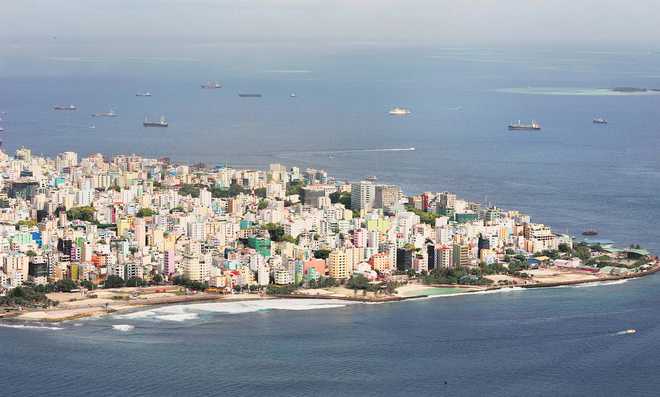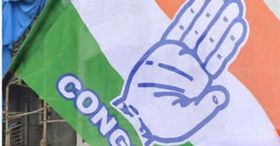
GRAB THE MOMENT: China may have extended an olive branch all but in name when it spoke against making Maldives a flashpoint with India.
Sandeep Dikshit
THE state of affairs inside the Maldives does give a bad odour: A President locks up all his political opponents; then goes ahead and arrests the Supreme Court Chief Justice when he tries to set them free. And while the `democracy loving corner' has itself in a twist, President Yameen caps his indiscretions by shuttering TV stations and imposing a state of emergency.
Yameen has a different version where he casts himself as a victim of a willful and spiteful Supreme Court Chief Justice: The order releasing the nine individuals was given in the Chamber and not at a hearing; some of the convicted have exhausted the three tiers of court and a few cases were in appeal; the Chief Justice also tried to remove the President and the Attorney General but was overruled by a majority on both occasions.
Despite being a honeymooner's paradise, Maldives has had a very brief, four-year dalliance, with universal franchise. The fairness of all elections before and after the 2008 polls is a question mark. India saw no competition for Maldives' affections till five years ago. But the fading years of the first democratically elected headed by Mohamed Nasheed saw him and the opposition bringing other countries into the equation.
And today, India is no longer an option for all the parties involved in the scrimmage for power in Maldives. Nasheed, a EU favourite, is India's designated man after Donald Trump phoned Narendra Modi and made common cause on the Maldives President's disobedience of the Supreme Court's orders. Then when South Block refused to host the Special Envoy of the Maldives President, it was clear that India had jettisoned its past tactic of maintaining ambiguity and preserving its options.
Maldives, in the eyes of New Delhi-centred military-security experts, has recently turned unruly. But dissonance with almost all of India's neighbours surfaced within a few months to a few years of emergence of post-colonial nation-states as they sought to resist India's assumption of being the inheritor of the British colonial mandate for the region.
In the early years, India could pull its weight in the region but not because of its military muscle. Barring Pakistan, other neighbours felt a sense of shared destiny with India in overcoming the handicaps of colonialism. Once the concept of nonalignment began losing its lustre, India began finding it difficult to manage its big brother pretensions.
But the recent bad blood with so many neighbours has just one precedent. It recalls a similar security-heavy response in the neighbourhood by the Rajiv Gandhi government, another dispensation like the current one that was heady with its parliamentary majority. There was an armed confrontation with China, a simmering defence scandal, hair trigger alert with Pakistan, on the losing side in Afghanistan and more than a finger in a raging militancy in Sri Lanka. All these attempts at donning the hard hat with not much in the cupboard by way of trading muscle or long-range military capabilities to back the pretensions had a catastrophic impact on the country's social fabric. The economic discontent provided the mobs for the disruptions caused by the Mandal and Ram Janmabhoomi agitations and finally we had the 1991 economic crises.
It must be galling for the Indian security-military establishment to adjust itself to a new power discourse because of rise of Chinese influence in a region where mainland Indian civilisation's historic cultural advantages were overlaid by two centuries of British India's dominance. But China is increasingly coming into conversations on India's security-related apprehensions in the neighourhood because the overlap of their strategic space has increased to now cover Afghanistan, and, of late, Maldives and Sri Lanka as well.
But instead of focusing on creating dialogue and interaction architectures that support regionalism and economics, the Modi government has opted for the excitement of playing the Great Game against China in concert with mostly extra regional powers. The potential threat from India has not been lost on China. The consequence is that both are attempting a military encirclement of the other.
The Indian proclivity to play a new Great Game may be influenced by notions of its influence and size. But it also reflects the Modi Government's disinterest in reworking the grammar of dealing with neighbours. Modi hasn't had a decent conversation with most of the neighbours.
While it is imperative to strengthen the bonds of technology, energy and security with distant countries, the Maldives setback should make the PMO think-tank realise that soon the Modi Government will no longer be able to politically gift-wrap tactically bold actions as strategic masterstrokes. The space for presenting tactical symbolism as strategic coherence may be narrowing.
One example is the Lok Sabha Speaker calling off a meeting of the Parliamentary Standing Committee on Defence which was to examine the claims made by a retired army officer about irreversible fortification of Chinese army positions on the Doklam plateau. That claim, if proven, will run counter to the Modi Government's spin that India had emerged with honours intact after last year's eye- ball to eye- ball security confrontation with China at the same site.
China has now declared that Gwadar port in Pakistan will also function as a forward base for its navy. In due course, Hambantota port in Sri Lanka could follow suit. The Modi Government appears more immersed in aligning itself with the military-security objectives of outside powers. On Maldives, South Block was buoyed by the conversation between Trump and Modi. But the Trump administration does not play a zero sum game. On the same day, China's main pointsman for foreign policy (and the gentleman who holds border talks with NSA Ajit Doval) was in Washington for in-depth discussions with his American counterpart.
The Modi Government has been found wanting in making a calculated walk back from foreign policy positions that no longer yield any dividend. An opportunity may have just risen after Beijing offered a thinly disguised olive branch on Maldives. An inability to change the grammar of dealing with neighbours is preventing us from accumulating the required power to make India tranquil, content, peaceful and happy.



























